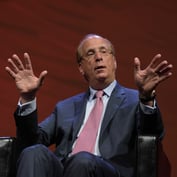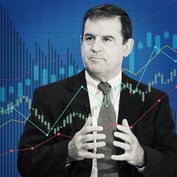Rising inflation isn’t on top stock picker John Buckingham’s worry list.
“I would love to see higher inflation, and I would love to see higher interest rates,” the value investor coolly tells ThinkAdvisor in an interview.
Both situations have historically benefited value, argues Buckingham, who has been managing investments for more than three decades and is principal and portfolio manager of Kovitz, based in Aliso Viejo, California.
He is the quintessential long-term, disciplined investor who ignores all noise and looks instead to economic and market history for reality, if not mooring.
“We try to take advantage of what the market gives us,” he says of his strategy, in the interview.
In the first five months of 2021, that has meant trimming a number of holdings in his portfolio, which typically has low turnover.
This year, there’s been “a little more,” he notes.
“We thought it prudent to reduce our exposure so as to initiate positions in other attractively priced stocks or to add to existing holdings to boost our ownership,” he says.
One new holding is Volkswagen. In our interview, he forecasts that ultimately it could very well overcome Tesla to become the world’s largest electric-vehicle manufacturer.
Further, Buckingham discusses why he sold some Nordstrom and Kohl’s stock and bought more AT&T and International Paper.
About the Federal Reserve’s starting to sell off its corporate bond holdings, announced on June 2, he ponders: Is this the first sign that the Fed is on the road to raising rates?
He then opines on President Joe Biden’s proposed retroactive capital gains tax increase: “It will probably not be as bad — if you will.”
Manager of the Al Frank Fund (VALUX) since its 1998 inception, Buckingham is also the long-time editor of “The Prudent Speculator” newsletter.
Through June 3, 2021, the fund has posted an annualized return of 10.91%, which compares to 7.94% for the benchmark Russell 3000 Value Index and 8.45% for the S&P 500.
Value investing isn’t just about buying “cheap stocks,” he maintains. And in the interview, he reveals the real secret of his investing success.
ThinkAdvisor interviewed Buckingham on June 4. He was speaking from his home in Laguna Beach, Calif.
Asked why his newsletter is called “The Prudent Speculator,” he said — summing up his M.O. — “All investing is speculating on the future. That can be done prudently by buying and patiently harvesting a broadly diversified portfolio of undervalued stocks.”
Here are highlights of our conversation:
THINKADVISOR: What impact could be expected from higher inflation, which everyone is worried about?
JOHN BUCKINGHAM: I don’t understand why people are worried. Historically, stocks have been a good hedge against inflation.
I guess the concern is that if we have higher inflation, it will force the Federal Reserve to raise interest rates, which many people think is a bad thing. I do not.
How come?
Rising inflation is good for value stocks. We should be happy because we want to get into a more normal monetary-policy climate for the Fed so they have ammunition when the next bad thing happens.
The inflation we’re seeing is likely to be transitory and a byproduct of the supply-chain issue and pent-up demand. All that will stabilize.
Of course, this idea that everybody is nervous or worried about inflation and higher interest rates hasn’t really been borne out by where stocks are — today, we’re three [points] away from an all-time high on the S&P 500.
Why don’t you worry about higher interest rates?
They’ve been good for value stocks. Since July of last year, value indexes’ performance has been fantastic.
Historically, value does well when interest rates rise. I would love to see higher inflation, and I would love to see higher interest rates.
But the only way to get those is if the economy is stronger.
What are your thoughts about the Fed’s starting to sell off its corporate bond holdings?
I don’t think they’ll be much market disruption because they’ll be selling them over the period of now through the end of the year. But the question is: Is this the first tapering of the accommodative monetary policy?
Are they now starting to “talk about” talking about raising rates? That has some people nervous.
I would like to see higher interest rates because that will benefit value stocks. And if the Fed’s starting to sell bond holdings leads to higher interest rates, woo-hoo!
In 2013, everyone was worried about the Fed taking away the punch bowl by raising interest rates and stopping bond buying. But when the threat of tapering and the actual tapering occurred, stock prices were significantly higher — the markets rebounded.
Thus far, the 2021 stock market has been quite volatile. Has there been more than usual turnover in your portfolio, in which typically there isn’t very much?
We’ve had a little more because the market has given us opportunity to trim a lot of stocks: There have been huge gains on many of our stocks that have done extraordinarily well [approaching] post-pandemic.
Such as?
When Nordstrom, for which we paid $14, was trading a few months later at $40, we wanted to take a little money off the table.
Nordstrom has made substantial investments in online [shopping], and their e-commerce business has grown rapidly. The pandemic wasn’t a bad thing for them; I think they’ll come out of this smelling like a rose.
What other holdings did you trim?
Kohl’s has done extraordinarily well. That’s why we took some money off on that, too.
When a stock goes from $20 to $60 in a relatively short period, we think it’s time to do that. Kohl’s is higher today than it was before the pandemic.
Kohl’s had been a dog for a while. We were getting a big dividend yield; but then the pandemic hit, and the dividend was eliminated.
But we didn’t bail out. We kept it. And once the vaccines came on the scene, Kohl’s went from $20 to $60. Also, as we go forward, the dividend is being reinstated.
[On May 20], Kohl’s reported phenomenal earnings, and the stock got crushed. So we were glad we had sold some. Now it’s at 53. That’s why we try to take advantage of what the market gives you.
Value investing isn’t just about buying cheap stocks. It’s also about ensuring that the companies have the ability to make it, grow again and if they’re in short-term difficulty, like Kohl’s and Nordstrom were, that they’re going to survive and won’t end up bankrupt.
What’s another stock in which you reduced your exposure?
Seagate, a data storage producer. The short squeeze in January was some of the reason for our trimming that one.
They have cryptocurrency exposure: an investment in Ripple. So Seagate is a crypto play in addition to being an inexpensive stock in an industry that we still think is likely to grow substantially.
Again, when your cost basis is $20 or $30 and the stock is trading at $80, you want to take some money off. But now it’s gone up more, and we wish we wouldn’t have taken that money off.
Any stocks that haven’t had big gains that you bought more of this year?
Lockheed Martin, International Paper and AT&T, among others.








 June 09, 2021 at 01:49 PM
June 09, 2021 at 01:49 PM












 Copyright © 2024 ALM Global, LLC. All Rights Reserved.
Copyright © 2024 ALM Global, LLC. All Rights Reserved.